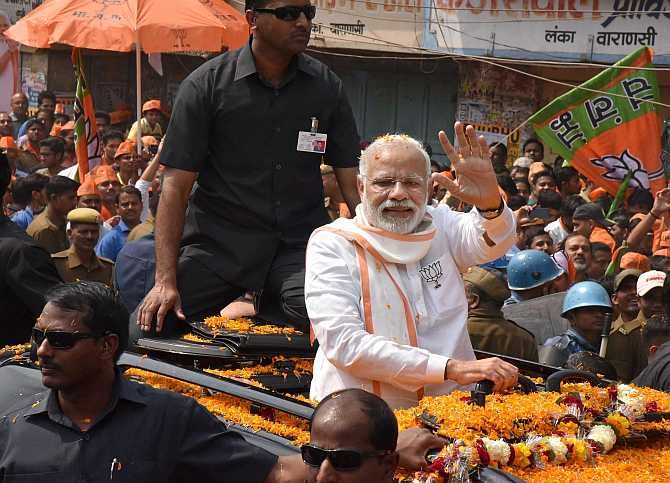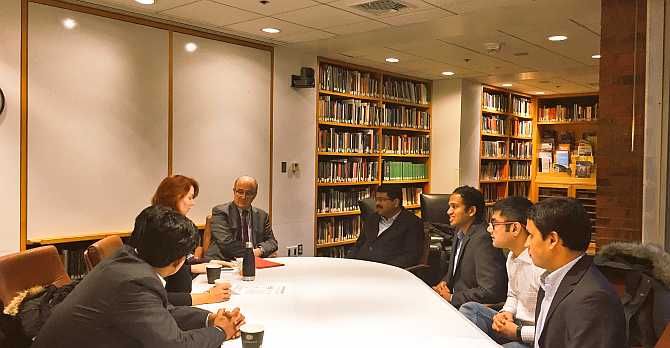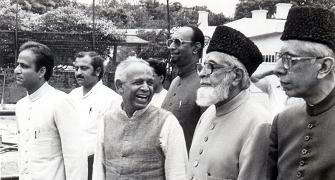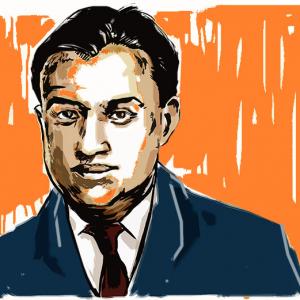'Amartya Sen is a citizen of the country who has every right to criticise or give his opinion on a policy decision.'
'Get back at him! Why get back at Harvard?'

Prateek Kanwal -- who wrote an open letter to Narendra Modi about his 'hard work is more powerful than Harvard' comment at an election rally in Uttar Pradesh last week -- tells Rediff.com's Prasanna D Zore why he crossed swords with the prime minister.
Prateek has been at Harvard for less than a year, but such is his respect for the university that he has taken up cudgels with the most powerful man in India for dragging his varsity in his battle of words with Harvard Professor Amartya Sen.
Ever since Prateek wrote his 'open letter' to Modi over his 'hard work is more powerful than Harvard' jibe at the Nobel Laureate for criticising demonetisation, his phone has not stopped ringing.
Some people want to conduct a television interview with him, others want him to write columns. And because of this 'open letter', which too calls demonetisation a 'disaster', Prateek's day now begins at 6.30 am instead of 7.30 am (US time).
"At Harvard our normal work day is 16 hours long, but now I need that extra hour to reply to tweets and do interviews," Prateek says over the phone from Cambridge, Massachusetts, at 7.30 in the morning.
"It's been quite hectic the last couple of days. I am completely ignoring the trolls; that's exactly the ideology I don't stand for," says Prateek who is studying public policy at Harvard.
Before he was admitted to the famed university, Prateek taught students at a municipal school in Kandivli, northwest Mumbai, for two years and later set up Teach for India chapters in Bengaluru and Ahmedabad.
"My aim is not to take jibes at people, my aim is to work for the country, solve its problems and that's what I exactly wanted to write (to the PM): Focus on economics, focus on policies, and forget taking jibes at each other."
"This culture in India (of taking jibes, and trolling on social media) is taking a turn for the worse. We just don't trust each other; we fight with each other; we just want to put the other person down," he says.
"Basically we are mimicking what our leaders are doing on the national stage," he adds.
Are you suggesting that Prime Minister Modi was trying to put down Dr Amartya Sen with his Harvard versus hard work comment?
It is not about just putting down an individual, in this case Dr Amartya Sen. I am talking about the greater culture... this is just one example.
In politics, outdoing each other without focusing on the real issues to be talked about (is the norm).
Why can't we focus on the policies and critique them constructively?
Obviously, no policy can be foolproof, but you need to admit your failure at some point.
That is what Dr Amartya Sen was pointing to. He was critiquing demonetisation and it had nothing personal against the prime minister.
As a citizen of this country (India), I am well within my rights to criticise a government policy.
He (Dr Sen) is a Nobel Laureate from a university which has been there for the last 500 years. There must be some credibility to what one learns at such a university versus two- -and-half years of ruling.
The prime minister must understand that these institutions were not built in a day.
And it is not just Amartya Sen who studied here or taught here; there are other renowned economists at Harvard. These economists proved their credentials with their rigour and hard work.
The prime minister must just focus on work, keep doing work and people, including ones like me, will rally behind him wholeheartedly.
People in the US are saying that 'Trump is not my president'. I am not saying that.
I am saying 'Modi is my PM,' and if he is my PM I have all the right to criticise him constructively and he has a right to reply in a very civil manner.
That's what democracy is all about.
In fact, you should reply to such policy critiques on a policy front.

What made you write the open letter to Prime Minister Modi?
It's very frustrating to see such debates not being conducted at a civil level.
It is full of prejudices, biases, trolling, and that is why I decided to write this letter to express my anguish at the way debates are taking shape these days.
These 140 character, one liners do not justify a policy debate; that needs more seriousness.
I wanted to talk about a couple of points that need to be kept in mind when you formulate and implement policies (like demonetisation).
If you make a policy, you need to have a clear idea of benefits you will derive out of it.
You just don't make policies in the dark and then retrospectively think about right and wrong.
Policies need to be clearly thought out in advance and then executed to perfection.
That is what I wanted to say; that is what Dr Amartya Sen also wanted to say.
I don't think Dr Amartya Sen has something personal against the prime minister.
During Vajpayee's time (Prime Minister Atal Bihari Vajpayee) too there were a lot of policy criticisms.
Did you see Vajpayeeji going down to this level? His answers to his critics were articulated in Parliament, not at election rallies.
I have not seen that since the time Prime Minister Modi came to office.
He is always in campaign mode and that's why I said why don't you just govern because that is what the country needs.
Your job is to make policies, implement them and govern the country.
In your letter you made a very critical and contentious observation that the PM's remark on Harvard will push away Indians like you who want to serve the country. What makes you think so?
There was a term in my social studies book called 'brain drain'. That word would always make me very angry.
You know America has been developed by Indians too. Our scientists, our doctors... if you need these people to come back to India you need to create an environment for it.
I think by making such remarks (hard work is more powerful than Harvard) you are telling academicians and people who have done well abroad that there is no place for you here.
Why would you mock people who are doing good work?
You should invite them to come and work for you and join the government.
Making such remarks goes on to signal the fact that you are very comfortable with where you are and you don't need any help.
It pushes people to stay back here (in the US or abroad) because they feel you have no value for the work they do.
If you think that no policy of yours requires any analysis, any scientific backing then people will not come to you.
You were at Harvard when the prime minister made this remark. How have the Indian academicians and Indian students at Harvard reacted to the PM's comment?
To be really frank, every day is a 16 hour day here. People are busy doing cutting edge research here, but it was this one off comment that needed to be replied to because if you do not reply to such things it spreads to other things as well.
I just wanted to put out an opinion from Harvard's perspective while admitting that this is not the general opinion out here.
I am sure people here will have their own views, but in general people were surprised by the PM's comment.
They are like 'Why would a prime minister, a person of such a stature, one of the most powerful persons in the country and the world ridicule an institution like Harvard?'
It is something which nobody expects from the prime minister of India.
Just because a prime minister mocked a university, you said that would isolate India from the world. Isn't that too simplistic an assumption?
Harvard is one of the biggest universities in the world and it has a grant of some $45 billion. That's equivalent to some big companies in India.
Would the PM have said the same thing about a Reliance or Adani or Facebook or Google? He goes and meets Facebook and Google CEOs. So, why ridicule any institution in the first place?
Why do you dub demonetisation a 'disaster'?
Clearly, 200 people died because of this policy. There is empirical evidence to show that.
Then crores of Indian stood in queues to exchange and deposit old notes that were banned because of demonetisation.
How many man hours do you think were lost when this happened and how did that harm India's production and productivity?
If so many people stood in queues for two months, the productive value of the economy went down.
Now, what was the need for such a policy that made people waste their time in queues and what have we got in return?
All the black money came in (deposited as accounted money into the banking system).
Even if you managed to get a few crores what point, what good, did demonetisation serve?
My point is there was loss of life and demonetisation, apart from not achieving anything, resulted in the loss of $200 million -- the statistical value of an average Indian in a lifetime being one million US dollars.
Also, the way this policy was implemented made it a disaster.
You have to think through policy loopholes in advance.
You can't continuously change the course of action after loopholes come to light. Every move has to be pre-empted.
But nothing of that sort happened. And that is what Harvard teaches you about the rigours of policy formulations and implementation.

Don't you think that the third quarter GDP numbers -- that showed India grew at a healthy 7 per cent between October-December 2016 -- demonetisation, especially when critics said the growth rate would slump to 6 or 6.2 pet cent?
Do you know how GDP was calculated for the October-December quarter in 2015? We changed the way we calculate GDP in 2015.
The way we calculated this number before 2015 was quite different. The problem with believing the third quarter 2016 GDP numbers is like comparing apples to oranges.
These numbers (published by the Central Statistical Organistaion) don't reflect the true numbers.
China has been talking about 10 to 12 per cent GDP growth for more than a decade now but these numbers don't add up. So, there is a way to project these numbers to suit oneself.
In a real sense if you were to look at the old way of calculating India's GDP numbers then we are still between 6 and 6.4 per cent.
You get this bump up to 7 per cent when you change the way you calculated this number.
If you look at these numbers critically, wearing an economist's lens, you will realise the difference between the numbers one can reach by following two different methods.
So, the numbers published by the CSO is a statistical mirage?
Exactly. When you are cooking you can add more masala into it and the dish looks very tasty, but it is just that.
It (the GDP numbers) have been spiced up a little bit.
Why are you not convinced by the GDP number?
Not just me; pick up any economist in the world and tell me if they are happy with these numbers.
Is there a debate in the classrooms at Harvard about these numbers?
Of course, there is debate, and a healthy one at that. A lot of the voices believe that these numbers have been glorified to show that demontesition gets a leg up.
What I am saying is that every government has instruments in its hand and they choose it to suit their needs.
In this case, I think this government has taken advantage of certain statistical methods to make sure the government looks good for the polls.
Don't you think the prime minister was not taking cudgels with Harvard, but just getting back at Amartya Sen?
Dear prime minister: Harvard is not just Amartya Sen and that is what I wanted to say. Amartya Sen is just a citizen of the country who has every right to criticise or give his opinion on a policy decision.
Get back at him! Why get back at Harvard?
What would be your priority once you come back to India?
I want to focus on my dream of making India a place for every student to get excellent education.
I want to work to put in place systems that will not fail our children every day and give them the right access, opportunity and exposure to make sure that everyone in India can aspire to join Harvard and not just the top one per cent who can afford and aspire to be at Harvard.
I would focus on the remaining 99 per cent and make sure every child gets these opportunities.










